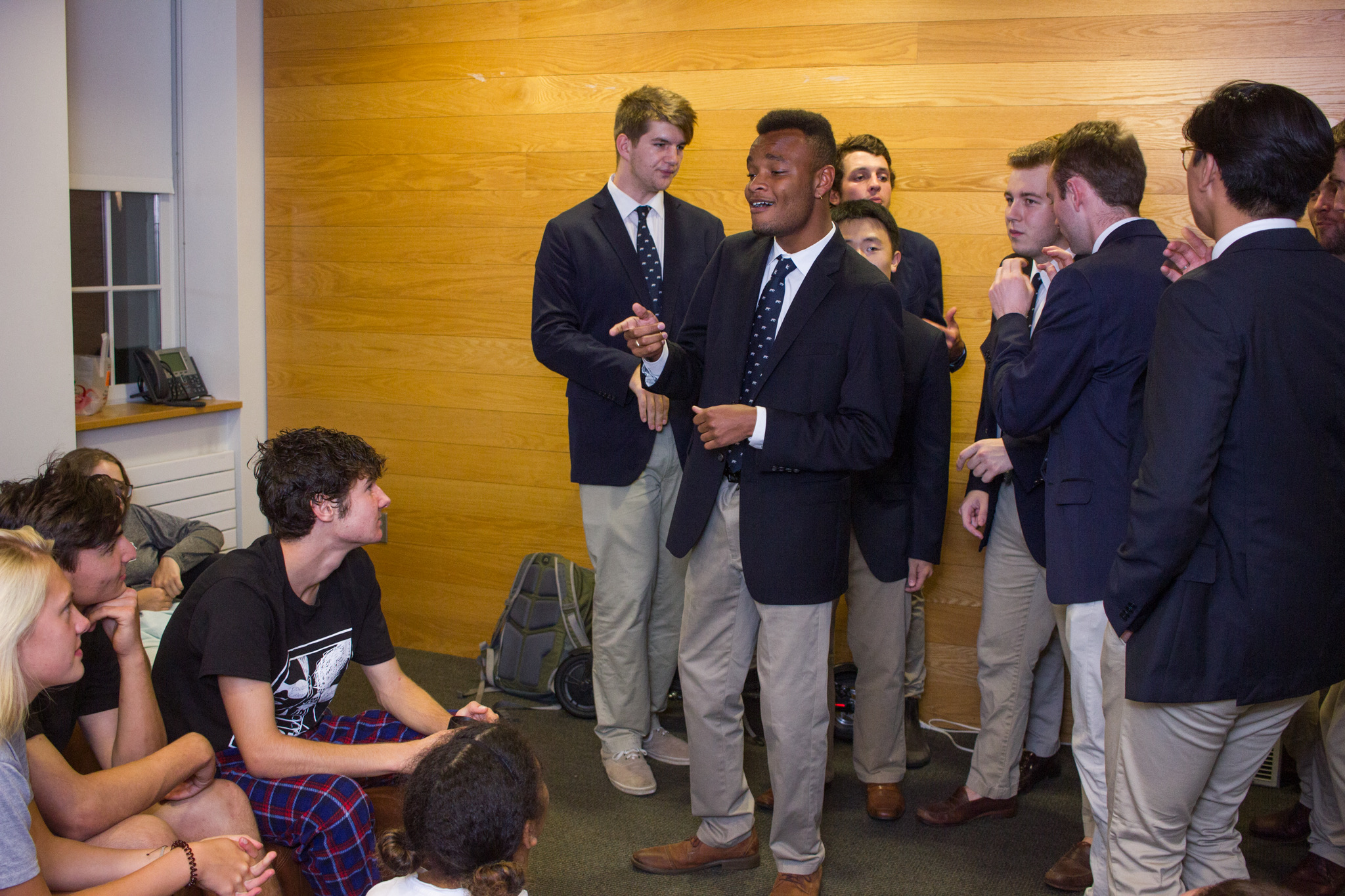The next big sing: a cappella’s whirlwind recruitment week
September 20, 2019
 Reuben Schafir
Reuben SchafirWith pews so full that students spilled over onto the floor, the current members of Bowdoin’s a cappella groups performed their best, hoping to attract their futures.
Supporters, friends and a cappella hopefuls packed into the Bowdoin Chapel last Friday night for the annual recruitment concert, where each of Bowdoin’s six groups performed two songs.
This concert and Dorm Sings—the annual convergence of all six groups on the halls and common rooms of the first-year bricks—make up Bowdoin a cappella’s annual search for new members.
Monday and Tuesday are jam-packed with auditions coordinated by the A Cappella Council. Many students try out for all groups they’re eligible for; others set their sights on one favorite.
But all auditionees face the same harrowing experience of singing for a panel of older students without any instruments to hide behind. To offset the intimidation factor, leaders try to make students as welcome as possible.
“It’s inherently really scary,” said Ayana Harscoet ’21, a member of Miscellania.
At the end of two days of auditions and callbacks, there is still more to come. Every year, according to A Cappella Council Co-President Brendan Pulsifer ’20, around a dozen students are contested—meaning they’ve gotten into more than one group and must choose which membership offer to accept.
What happens next is called the draft. Contested students receive a phone call with the news and are given 10 minutes to decide between groups.
Pulsifer explains that it is a way of making sure students can make the choice for themselves.
“It sounds more intense than it is,” Pulsifer said. “We make sure it’s very fair, so there’s no extra wooing.”
A cappella groups are small enough that a single year can radically change a group’s composition—Miscellania and the Meddiebempsters each lost four singers at the end of last year. With groups of around a dozen singers, that turnover comprises a quarter of their membership. For the Longfellows, that number was almost half—with five graduates and two juniors studying abroad, last year’s total of 15 singers was reduced to eight current members.
The urgency this brought to their recruiting efforts isn’t necessarily a negative, says Ben Zevallos ’21, musical director for the Longfellows.
“It’s a motivational tool to get us where we need to be,” he said. “The more we lose, the more effort we’re putting in to recruit new members and the harder we want to work to sound good.”
Balance is essential. Each voice matters. Recruitment is a challenge, more of an art than a science. This is because of the emphasis on student leadership that sets a cappella apart from other performance opportunities at Bowdoin.
Groups arrange their own music, run their own rehearsals and shape their own cultural space and dynamic—a flexibility that allows individuals to stand out, whether as soloists, arrangers, beatboxers or especially friendly recruiters.
Despite the difficulty of continuity when individual personalities are so pronounced, there are some through lines that hold year after year. For Harscoet, Miscellania is all about sisterhood.
“We all have each other’s backs in a way that is beyond just being a musical group,” Harscoet said. “Even if people come and go, that still holds us together.”
Groups differ in vibe, both musically and interpersonally, and ranging from casual to classical, color-coordinated to eclectic. Likewise, diversity varies—each group has an array of ages, races, class years and gender identities. This year, according to Pulsifer, audition sheets are overwhelmingly female.
“I think a cappella can be and has been a very white New England-y thing,” said Harscoet.
She added, however, that Miscellania auditions are an opportunity to pursue greater diversity, both in race and in background.
“It’s not just raw musical talent,” she added.
Though the goal is to achieve the best sound possible, leaders look beyond vocal ability. Zevallos hones in on what he thinks is most essential: character.
“We want this idea of teamwork and integrity and trust,” he said. “Although it’s difficult to gauge in such a short period of time, that’s definitely something that we’re looking for. And we try to exude that same level of warmth.”
Pulsifer echoed this sentiment, stressing the importance of making rehearsal time cohesive and enjoyable when bringing in new members.
“It’s not just your voice,” he says. “It’s you.”

Comments
Before submitting a comment, please review our comment policy. Some key points from the policy: